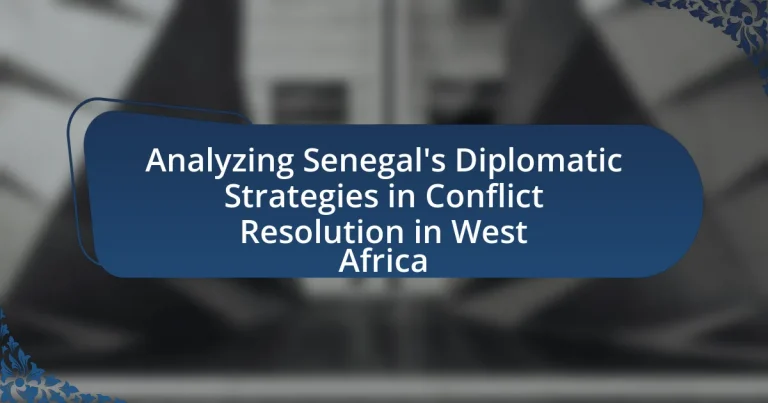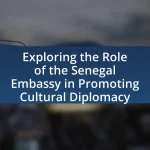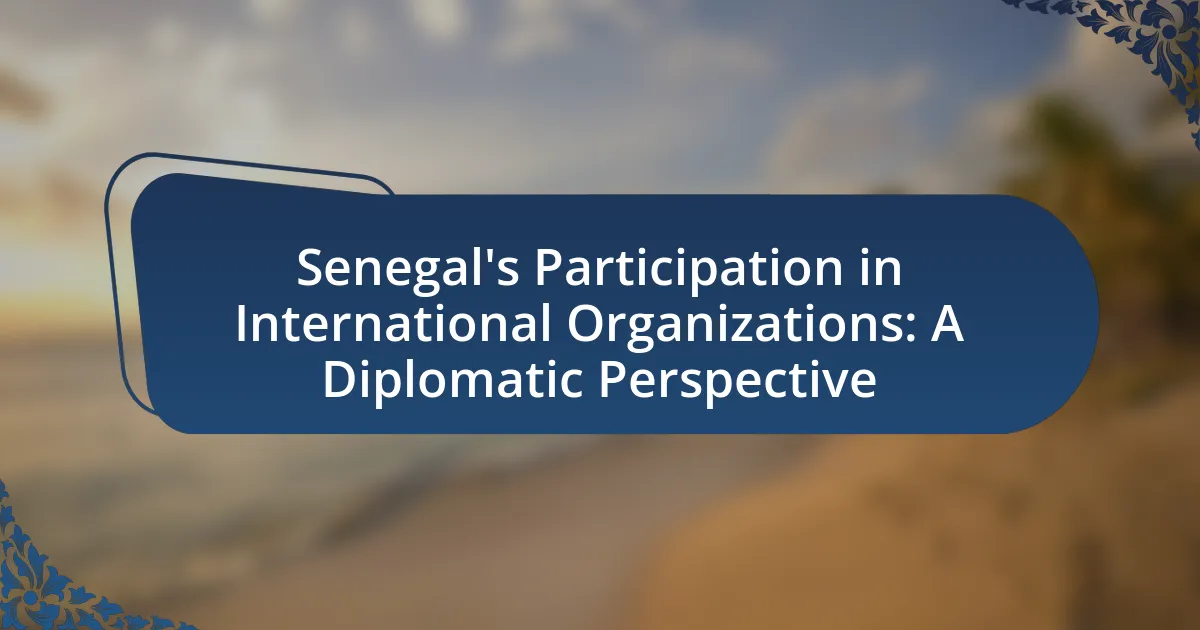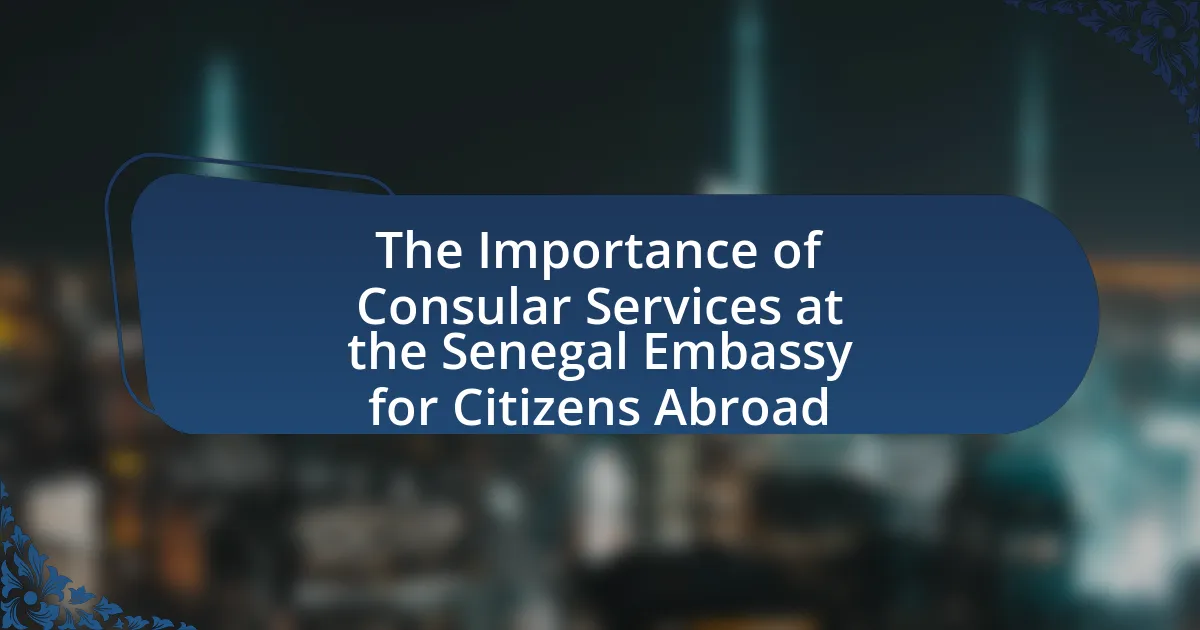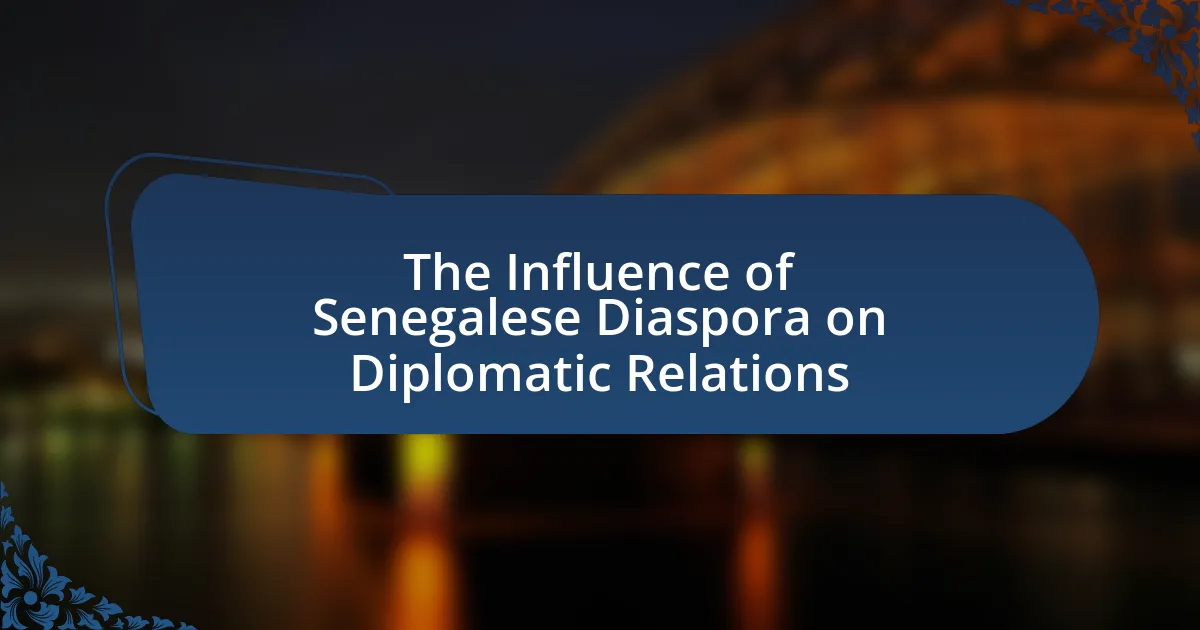Senegal’s diplomatic strategies in conflict resolution in West Africa are characterized by a multifaceted approach that includes mediation, regional cooperation, and peacekeeping initiatives. The country actively engages in organizations such as the Economic Community of West African States (ECOWAS) and the African Union, leveraging its historical context and relationships with neighboring countries to promote stability. Key historical events, including its colonial past and independence, have shaped Senegal’s commitment to dialogue and multilateralism in addressing regional conflicts. Despite facing challenges such as political instability and limited resources, Senegal continues to prioritize inclusive dialogue and collaboration to enhance its effectiveness in conflict resolution efforts across West Africa.
What are Senegal’s Diplomatic Strategies in Conflict Resolution in West Africa?
Senegal employs a multifaceted diplomatic strategy in conflict resolution in West Africa, focusing on mediation, regional cooperation, and peacekeeping initiatives. The country actively participates in the Economic Community of West African States (ECOWAS), leveraging this platform to facilitate dialogue among conflicting parties, as seen in its involvement in the resolution of the Ivorian crisis in 2002. Additionally, Senegal has a history of contributing troops to United Nations peacekeeping missions, which underscores its commitment to maintaining stability in the region. The Senegalese government also emphasizes the importance of dialogue and negotiation, often hosting peace talks and engaging in diplomatic outreach to foster understanding and collaboration among West African nations.
How has Senegal’s historical context shaped its diplomatic strategies?
Senegal’s historical context has significantly shaped its diplomatic strategies by fostering a commitment to regional stability and multilateralism. The legacy of colonialism, particularly its experience as a French colony, has influenced Senegal’s approach to diplomacy, emphasizing cooperation with former colonial powers and regional neighbors. Additionally, Senegal’s role as a founding member of the Organization of African Unity (now the African Union) and its active participation in peacekeeping missions reflect its historical commitment to conflict resolution in West Africa. This commitment is further evidenced by Senegal’s mediation efforts in conflicts such as the Gambian political crisis in 2017, showcasing its diplomatic strategy rooted in historical experiences of unity and collaboration.
What key historical events influenced Senegal’s approach to diplomacy?
Senegal’s approach to diplomacy has been significantly influenced by its colonial history, independence, and regional conflicts. The country’s experience under French colonial rule, which lasted until 1960, shaped its diplomatic outlook by instilling a desire for sovereignty and self-determination. Following independence, Senegal adopted a policy of non-alignment and sought to position itself as a mediator in regional conflicts, exemplified by its role in the Organization of African Unity and later the African Union. Additionally, the civil war in neighboring countries, such as the Casamance conflict, has prompted Senegal to engage in diplomatic efforts to promote stability and peace in West Africa. These historical events collectively underscore Senegal’s commitment to diplomacy as a means of conflict resolution and regional cooperation.
How does Senegal’s colonial past affect its current diplomatic relations?
Senegal’s colonial past significantly influences its current diplomatic relations by shaping its identity and approach to regional cooperation. The legacy of French colonialism has fostered a strong connection with France, which remains a key partner in economic and military matters. This historical relationship facilitates Senegal’s role as a mediator in West African conflicts, as seen in its involvement in peacekeeping missions and diplomatic negotiations, such as those in Mali and The Gambia. Furthermore, Senegal’s colonial history has instilled a commitment to multilateralism, evident in its active participation in organizations like ECOWAS and the African Union, where it advocates for stability and conflict resolution in the region.
What role does Senegal play in regional organizations for conflict resolution?
Senegal plays a pivotal role in regional organizations for conflict resolution, particularly through its active participation in the Economic Community of West African States (ECOWAS) and the African Union (AU). As a founding member of ECOWAS, Senegal has been instrumental in promoting peace and stability in West Africa, contributing troops to peacekeeping missions and facilitating dialogue in conflict situations, such as in The Gambia during the 2017 political crisis. Additionally, Senegal’s diplomatic efforts are evident in its hosting of peace talks and its commitment to the AU’s initiatives aimed at conflict prevention and resolution, reinforcing its status as a key player in regional stability.
How does Senegal’s membership in ECOWAS impact its diplomatic efforts?
Senegal’s membership in ECOWAS enhances its diplomatic efforts by providing a platform for regional collaboration and conflict resolution. As a member of the Economic Community of West African States, Senegal engages in collective security initiatives and diplomatic dialogues that strengthen its influence in regional matters. For instance, Senegal has actively participated in ECOWAS-led peacekeeping missions, such as in The Gambia in 2017, which demonstrated its commitment to regional stability and reinforced its diplomatic standing among member states. This involvement not only showcases Senegal’s leadership role but also facilitates stronger bilateral and multilateral relationships within West Africa, ultimately bolstering its diplomatic effectiveness.
What initiatives has Senegal undertaken within the African Union for peacekeeping?
Senegal has actively participated in peacekeeping initiatives within the African Union by contributing troops and resources to various missions across the continent. Notably, Senegal has been involved in the African Union Mission in Somalia (AMISOM), providing military personnel to support efforts aimed at stabilizing the region and combating terrorism. Additionally, Senegal has played a significant role in the African Standby Force, which is designed to enable rapid deployment of peacekeeping forces in response to crises. These contributions underscore Senegal’s commitment to regional stability and conflict resolution in West Africa, reflecting its strategic diplomatic approach within the African Union framework.
What are the main principles guiding Senegal’s diplomatic strategies?
The main principles guiding Senegal’s diplomatic strategies include multilateralism, regional cooperation, and conflict resolution through dialogue. Senegal emphasizes multilateralism by actively participating in international organizations such as the African Union and the United Nations, which enhances its diplomatic influence and fosters collaborative solutions to regional issues. Regional cooperation is evident in Senegal’s involvement in the Economic Community of West African States (ECOWAS), where it plays a key role in promoting stability and economic integration among member states. Additionally, Senegal prioritizes conflict resolution through dialogue, as demonstrated by its mediation efforts in various West African conflicts, including its role in the peace process in Guinea-Bissau. These principles reflect Senegal’s commitment to maintaining peace and stability in the region.
How does Senegal prioritize dialogue and negotiation in conflict resolution?
Senegal prioritizes dialogue and negotiation in conflict resolution by actively engaging in diplomatic discussions and fostering inclusive dialogue among conflicting parties. The Senegalese government has a history of mediating regional conflicts, exemplified by its role in the Gambian political crisis in 2017, where it facilitated negotiations that led to a peaceful transition of power. Additionally, Senegal’s commitment to the African Union’s principles emphasizes the importance of dialogue as a means to resolve disputes, reflecting its broader diplomatic strategy aimed at maintaining stability in West Africa.
What emphasis does Senegal place on multilateralism in its diplomatic efforts?
Senegal places a strong emphasis on multilateralism in its diplomatic efforts, viewing it as essential for regional stability and conflict resolution. The country actively participates in international organizations such as the United Nations and the African Union, advocating for collective action in addressing security challenges in West Africa. Senegal’s commitment to multilateralism is evidenced by its role in peacekeeping missions and its involvement in diplomatic initiatives aimed at fostering dialogue among conflicting parties, thereby reinforcing its position as a key player in promoting regional cooperation and stability.
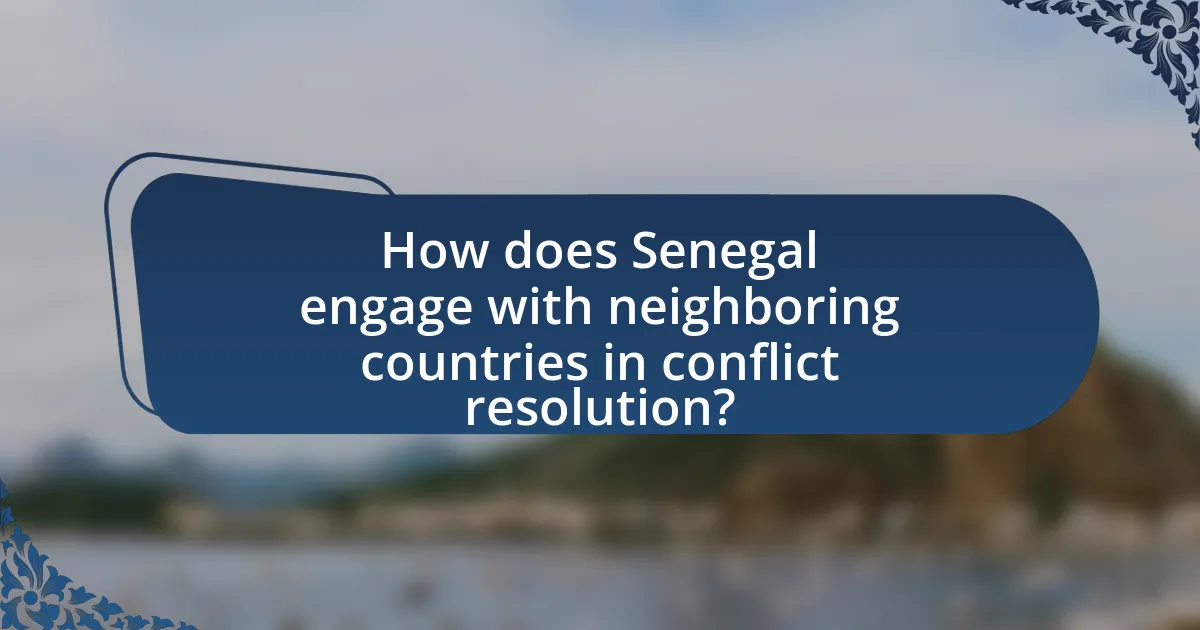
How does Senegal engage with neighboring countries in conflict resolution?
Senegal engages with neighboring countries in conflict resolution primarily through diplomatic dialogue, regional cooperation frameworks, and participation in peacekeeping missions. The country actively collaborates with the Economic Community of West African States (ECOWAS) to mediate conflicts, exemplified by its role in the resolution of the political crisis in The Gambia in 2016, where Senegal led a diplomatic intervention that helped restore order. Additionally, Senegal has contributed troops to various peacekeeping operations in the region, reinforcing its commitment to stability and security in West Africa.
What bilateral relationships are crucial for Senegal’s diplomatic strategies?
Senegal’s diplomatic strategies are significantly influenced by its bilateral relationships with France, the United States, and neighboring West African countries such as Mali and Guinea. The historical ties with France, stemming from colonial times, provide Senegal with political and economic support, while the partnership with the United States enhances security cooperation and development aid. Additionally, Senegal’s relationships with Mali and Guinea are crucial for regional stability and conflict resolution, as they collaborate on security initiatives and address shared challenges such as terrorism and migration. These relationships are foundational to Senegal’s role as a mediator in West African conflicts, exemplified by its involvement in peacekeeping missions and diplomatic negotiations in the region.
How does Senegal collaborate with Mali in addressing regional conflicts?
Senegal collaborates with Mali in addressing regional conflicts primarily through diplomatic engagement and participation in multilateral organizations. Both countries are members of the Economic Community of West African States (ECOWAS), which facilitates joint efforts in conflict resolution and peacekeeping initiatives. For instance, Senegal has contributed troops to ECOWAS missions aimed at stabilizing Mali during periods of unrest, such as the deployment during the 2012 Tuareg rebellion. Additionally, Senegal has engaged in bilateral discussions with Mali to enhance security cooperation and share intelligence, which is crucial for combating terrorism and organized crime in the Sahel region. This collaborative approach is further supported by Senegal’s commitment to regional stability, as evidenced by its active role in peace negotiations and support for Mali’s transitional government following political upheaval.
What role does Senegal play in mediating disputes between Guinea and its neighbors?
Senegal plays a significant role in mediating disputes between Guinea and its neighbors by acting as a diplomatic intermediary and facilitator of dialogue. This involvement is rooted in Senegal’s historical relationships and regional influence within the Economic Community of West African States (ECOWAS), which promotes peace and stability in the region. Senegal has participated in various peacekeeping missions and has hosted negotiations aimed at resolving tensions, such as those arising from border disputes or political conflicts. For instance, Senegal’s leadership in ECOWAS has been instrumental in addressing issues related to the political crisis in Guinea, demonstrating its commitment to regional stability and conflict resolution.
How does Senegal utilize cultural diplomacy in conflict resolution?
Senegal utilizes cultural diplomacy in conflict resolution by promoting dialogue and understanding through its rich cultural heritage and artistic expressions. The country engages in initiatives such as cultural exchanges, festivals, and artistic collaborations that foster mutual respect and cooperation among conflicting parties. For instance, Senegal’s hosting of the Festival of African Arts and Culture serves as a platform for dialogue, allowing diverse groups to share their narratives and perspectives, which can mitigate tensions. Additionally, Senegal’s emphasis on traditional values and communal practices in its diplomatic efforts reinforces social cohesion, as seen in its mediation roles in regional conflicts, such as in Guinea-Bissau and Mali, where cultural understanding played a crucial role in peace negotiations.
What cultural initiatives does Senegal promote to foster regional peace?
Senegal promotes cultural initiatives such as the Festival of African Arts (FESMAN) and the promotion of interfaith dialogue to foster regional peace. FESMAN, which showcases African culture and arts, serves as a platform for dialogue and understanding among diverse communities, thereby enhancing social cohesion. Additionally, Senegal’s commitment to interfaith dialogue, exemplified by its support for religious tolerance and collaboration among different faiths, contributes to reducing tensions and fostering a peaceful coexistence in the region. These initiatives are part of Senegal’s broader diplomatic strategy to promote stability and harmony in West Africa.
How does Senegal’s cultural heritage influence its diplomatic relations?
Senegal’s cultural heritage significantly influences its diplomatic relations by fostering a sense of identity and unity that enhances its role as a mediator in West African conflicts. The country’s rich traditions, including the principles of Teranga, which emphasizes hospitality and community, create a diplomatic environment conducive to dialogue and negotiation. This cultural framework has enabled Senegal to host peace talks and serve as a neutral ground for various regional disputes, such as the Gambian political crisis in 2017, where Senegal played a crucial role in facilitating a peaceful transition of power. Additionally, Senegal’s historical ties to both African and Islamic cultures allow it to engage effectively with diverse stakeholders, further solidifying its position as a key diplomatic player in the region.
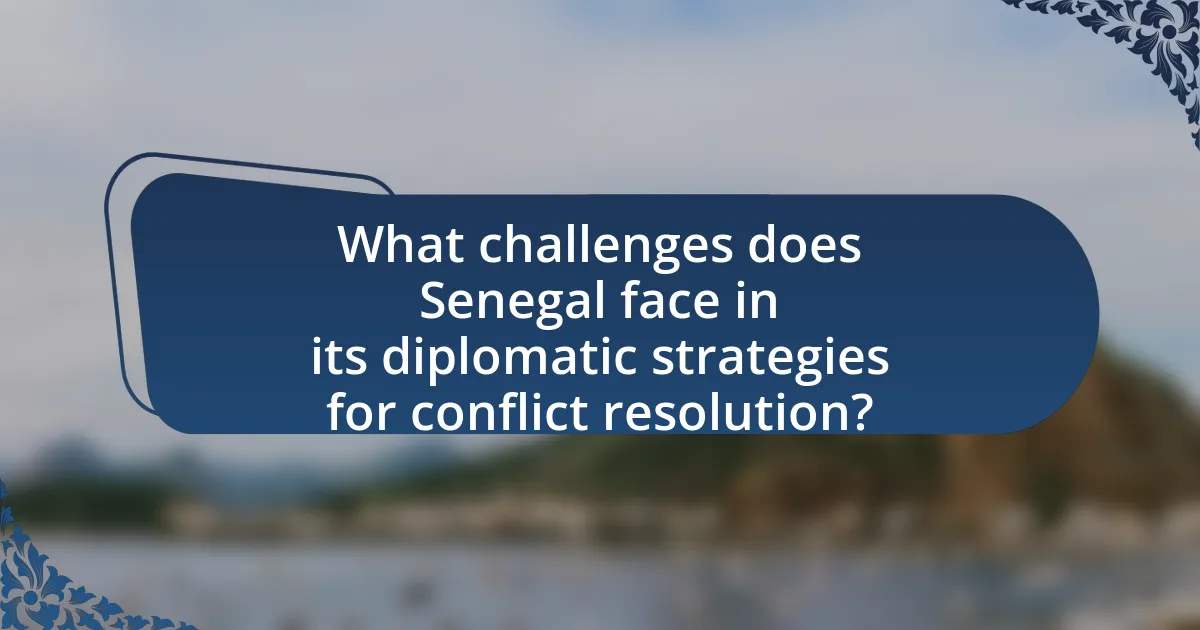
What challenges does Senegal face in its diplomatic strategies for conflict resolution?
Senegal faces several challenges in its diplomatic strategies for conflict resolution, including regional instability, limited resources, and competing interests among stakeholders. The country’s diplomatic efforts are often hindered by the complex political dynamics in West Africa, where conflicts in neighboring countries like Mali and Guinea-Bissau can spill over and affect Senegal’s security and diplomatic initiatives. Additionally, Senegal’s financial and logistical constraints limit its ability to engage effectively in peacekeeping and mediation efforts. Furthermore, the diverse interests of local and international actors complicate consensus-building, making it difficult for Senegal to navigate the intricacies of conflict resolution in the region.
What internal factors hinder Senegal’s diplomatic effectiveness?
Senegal’s diplomatic effectiveness is hindered by internal factors such as political instability, limited resources, and bureaucratic inefficiencies. Political instability, characterized by frequent changes in leadership and governance challenges, undermines consistent diplomatic engagement. Limited resources restrict Senegal’s ability to project influence and sustain diplomatic initiatives, particularly in conflict resolution efforts. Bureaucratic inefficiencies, including slow decision-making processes and lack of coordination among governmental agencies, further impede the country’s capacity to respond effectively to diplomatic challenges. These factors collectively diminish Senegal’s role as a mediator in regional conflicts, impacting its overall diplomatic effectiveness in West Africa.
How do political instability and governance issues affect Senegal’s diplomacy?
Political instability and governance issues significantly undermine Senegal’s diplomacy by eroding its credibility and ability to engage effectively with international partners. For instance, instances of political unrest, such as the protests in 2021 against President Macky Sall’s government, have raised concerns among foreign investors and diplomatic allies about the stability of the region. This instability can lead to a reduction in foreign aid and investment, which are crucial for Senegal’s economic development and diplomatic leverage. Furthermore, governance issues, including corruption and lack of transparency, can hinder Senegal’s role as a mediator in regional conflicts, as seen in its efforts to facilitate dialogue in the Gambian political crisis. Thus, the interplay of political instability and governance challenges directly impacts Senegal’s diplomatic effectiveness and its standing in West African affairs.
What economic challenges impact Senegal’s ability to engage in conflict resolution?
Senegal faces several economic challenges that hinder its ability to engage effectively in conflict resolution. Limited financial resources restrict the government’s capacity to allocate funds for diplomatic initiatives and peacekeeping missions. For instance, Senegal’s GDP growth has been inconsistent, averaging around 4% in recent years, which constrains public spending on foreign policy and conflict mediation efforts. Additionally, high unemployment rates, particularly among youth, create social instability that diverts attention and resources away from international engagement. Furthermore, reliance on agriculture and vulnerability to climate change impacts exacerbate economic instability, limiting Senegal’s diplomatic leverage in regional conflicts. These economic constraints collectively undermine Senegal’s role as a mediator in West African conflicts.
What external pressures influence Senegal’s diplomatic strategies?
Senegal’s diplomatic strategies are influenced by external pressures such as regional security dynamics, economic partnerships, and international political alliances. The country’s geographical position in West Africa necessitates a focus on stability in neighboring nations, particularly in conflict-prone areas like Mali and Guinea-Bissau, which directly impacts Senegal’s diplomatic engagements. Additionally, Senegal’s economic ties with the European Union and the United States shape its foreign policy, as these relationships often come with expectations for political alignment and support in regional initiatives. Furthermore, Senegal’s membership in organizations like the African Union and ECOWAS subjects its diplomatic strategies to collective regional goals and pressures, particularly in conflict resolution efforts.
How do global geopolitical dynamics affect Senegal’s role in West Africa?
Global geopolitical dynamics significantly enhance Senegal’s role in West Africa by positioning it as a mediator and stabilizing force in regional conflicts. Senegal’s strategic location and historical ties with both Western and African nations allow it to engage effectively in diplomatic negotiations, as evidenced by its involvement in peacekeeping missions and conflict resolution efforts in countries like Mali and Guinea-Bissau. Furthermore, Senegal’s membership in organizations such as ECOWAS and the African Union enables it to leverage international partnerships and support, reinforcing its influence in promoting regional stability and cooperation.
What impact do foreign interventions have on Senegal’s diplomatic efforts?
Foreign interventions significantly enhance Senegal’s diplomatic efforts by providing additional resources and international legitimacy. For instance, Senegal’s involvement in peacekeeping missions, supported by foreign nations and organizations, has bolstered its reputation as a mediator in regional conflicts, such as in The Gambia and Mali. This support allows Senegal to leverage its diplomatic initiatives more effectively, as seen in its role in the Economic Community of West African States (ECOWAS) where foreign backing has facilitated negotiations and conflict resolution strategies.
What best practices can enhance Senegal’s diplomatic strategies in conflict resolution?
To enhance Senegal’s diplomatic strategies in conflict resolution, the country should prioritize inclusive dialogue, regional collaboration, and capacity building. Inclusive dialogue ensures that all stakeholders, including marginalized groups, are represented, fostering trust and legitimacy in the process. Regional collaboration is vital, as Senegal can leverage its position within the Economic Community of West African States (ECOWAS) to coordinate efforts and share resources effectively. Capacity building, particularly in conflict mediation and negotiation skills, equips diplomats and local leaders with the tools necessary to address conflicts proactively. These practices are supported by Senegal’s historical role in peacekeeping and mediation, exemplified by its involvement in the Gambian political crisis in 2017, where Senegal played a crucial role in facilitating a peaceful transition of power.
How can Senegal strengthen its partnerships with international organizations?
Senegal can strengthen its partnerships with international organizations by actively engaging in collaborative initiatives that address regional security and development challenges. By participating in peacekeeping missions and conflict resolution efforts, Senegal demonstrates its commitment to stability in West Africa, which enhances its credibility and fosters trust with organizations such as the United Nations and the African Union. For instance, Senegal has contributed troops to various UN peacekeeping missions, showcasing its dedication to international peace and security. This proactive approach not only solidifies existing partnerships but also attracts new collaborations focused on sustainable development and humanitarian assistance.
What strategies can Senegal adopt to improve its mediation skills?
Senegal can improve its mediation skills by enhancing training programs for diplomats and mediators, focusing on conflict resolution techniques and negotiation strategies. By investing in specialized training, Senegalese diplomats can gain a deeper understanding of the complexities involved in mediation, which is crucial for effective conflict resolution. For instance, the African Union has emphasized the importance of capacity building in mediation, highlighting that trained mediators are more successful in facilitating dialogue and reaching agreements. Additionally, Senegal can strengthen partnerships with international organizations, such as the United Nations, to access resources and expertise in mediation practices. This collaboration can provide Senegal with best practices and frameworks that have been successful in other contexts, thereby improving its overall mediation effectiveness.
